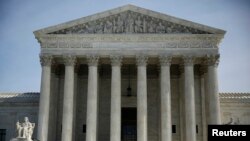The U.S. Supreme Court appeared divided Tuesday during oral arguments in what one justice termed a "bizarre" case between a New Jersey town and a former police officer who contends he was demoted as political payback.
The nation's highest court has never ruled on whether the right of free speech and association, guaranteed by the U.S. Constitution's First Amendment, prohibits the government from taking action against an employee based on its mistaken perception that he is asserting a political position.
But that's what happened to Jeffrey Heffernan, a 20-year police veteran in Paterson, N.J., who was spotted picking up a yard sign supporting an opposition candidate during the run-up to the city's 2006 mayoral election.
Heffernan said the sign was going to be put in the yard of his bedridden mother, who wanted it there to replace one that had been stolen. The policeman said he had no role in the election campaign, although he was a close friend of the candidate.
Heffernan, who has since left the Paterson force, was not even eligible to vote in the city, since he lived elsewhere.
Still, word spread of Heffernan's supposedly open political support for mayoral challenger Lawrence Spagnola.
The police chief and his executive officer — Heffernan's direct supervisor — supported the incumbent mayor, Jose Torres, who was running for re-election.
Heffernan, newly promoted to detective the year before, was quickly reassigned to foot patrol for "overt involvement in a political election."
He sued, contending his First Amendment rights had been violated, and a federal jury initially awarded Heffernan $105,000 in damages.
But the judge retroactively recused himself, citing a conflict of interest, and the case was ultimately thrown out because Heffernan admitted he did not actively campaign for Spagnola or assert his political views. Two different trial judges and appellate panels ruled he could not invoke free speech protections because he was not actually exercising his rights.
Heffernan appealed to the Supreme Court.
The nine justices, who will rule on the case this year, appeared split over whether Heffernan was even exercising his First Amendment rights during the 2006 incident.
"This is a bizarre case, that comes to [the court] on the assumption that he is completely politically apathetic," argued Paterson's lawyer, Tom Goldstein, who contended that Heffernan could have a case under New Jersey's collective bargaining agreements or civil rights laws, but not under the Constitution.
"It is bizarre," agreed Justice Antonin Scalia, known for his conservative positions on many legal matters. Justice Samuel Alito called the case "highly artificial."
But Heffernan's lawyers said the former policeman's demotion would have a "chilling effect" on political association everywhere unless the earlier court rulings were rejected.
They said if the ruling were left to stand, the government could fire any employee just on the belief — even incorrect — that he was a Democrat or Republican, causing the person to worry about misperceptions of his political views or actions.
Justice Elena Kagan took that position one step further.
She asked the city's lawyers if they believed a newly elected Democrat, for example, could dismiss "every person without a well-known political view, every couch potato out there," changing the entire character of the office, because the official preferred one political view over another.
"Part of the reason we have these [First Amendment] protections is because we worry the government is doing things for impermissible reasons ... that the government wants to create a world of speech in which everybody agrees with it and nobody opposes it," Kagan said.





